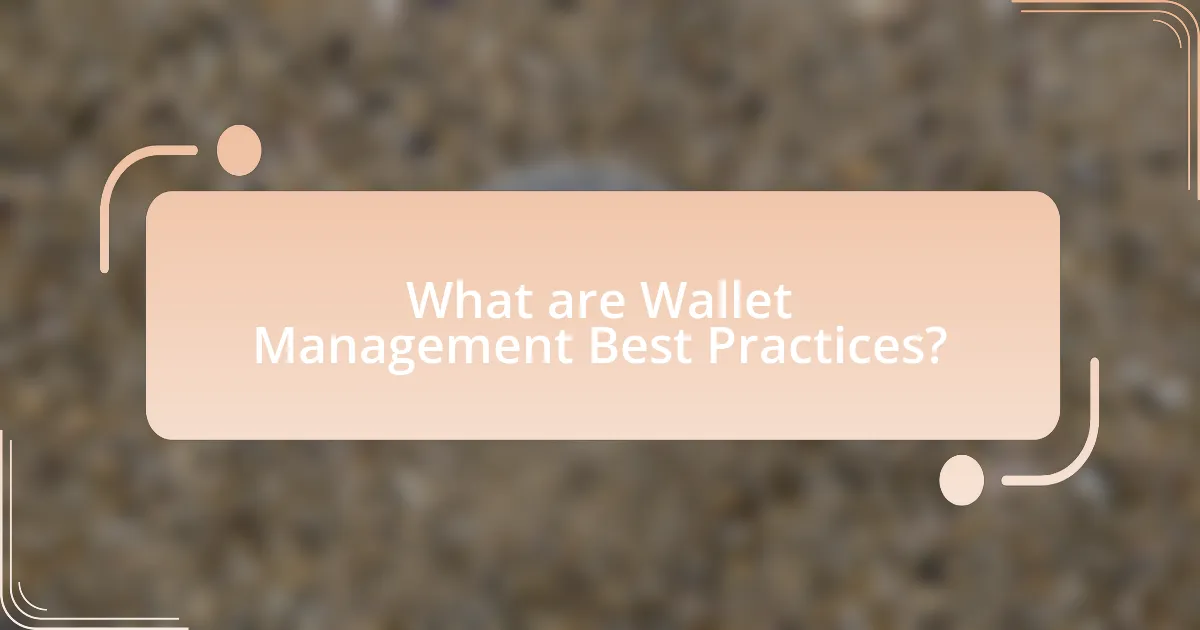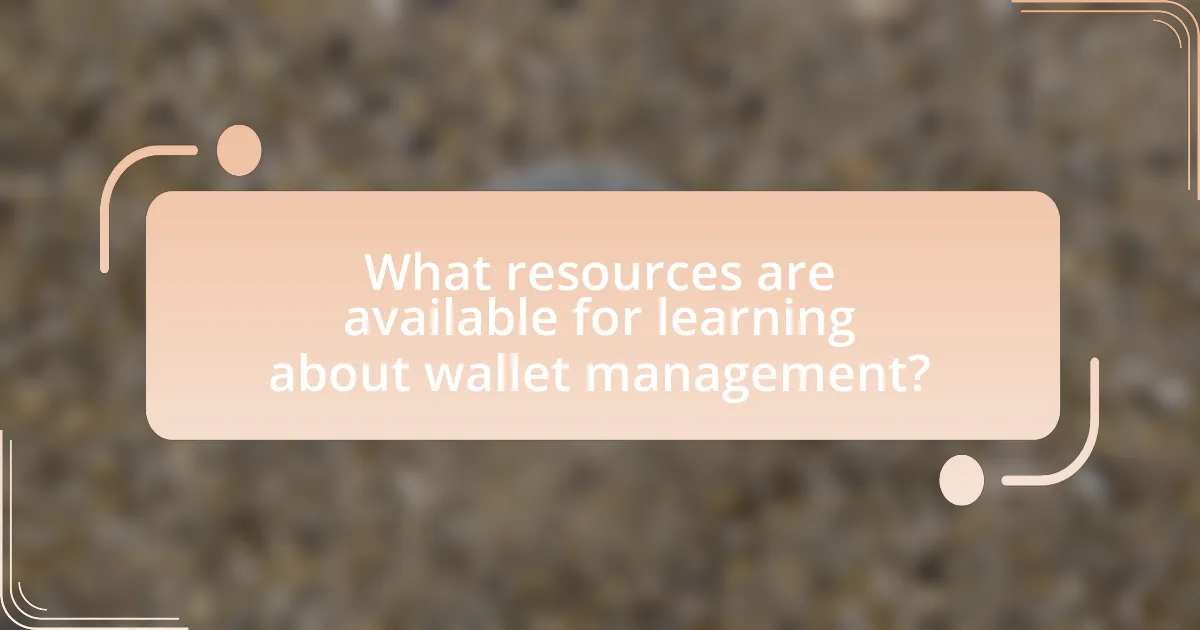The article focuses on wallet management best practices, emphasizing the importance of securing private keys, utilizing hardware wallets, enabling two-factor authentication, and staying vigilant against phishing attempts. It outlines how effective wallet management can enhance financial security by allowing individuals to track and control their assets, while also detailing the risks associated with poor management, such as identity theft and financial loss. Additionally, the article highlights the significance of education in mitigating these risks and provides resources, including online courses and books, to improve wallet management skills. Key principles discussed include security, organization, and regular monitoring, which are essential for maintaining financial oversight and achieving personal finance goals.

What are Wallet Management Best Practices?
Wallet management best practices include securing private keys, using hardware wallets for long-term storage, enabling two-factor authentication, regularly updating wallet software, and being cautious of phishing attempts. Securing private keys is crucial as they grant access to funds; losing them can result in irreversible loss. Hardware wallets, such as Ledger or Trezor, provide enhanced security by storing keys offline, minimizing exposure to online threats. Two-factor authentication adds an extra layer of security, making unauthorized access more difficult. Regular software updates ensure that wallets are protected against vulnerabilities. Lastly, being vigilant against phishing attempts helps prevent unauthorized access to wallets, as attackers often use deceptive tactics to gain sensitive information.
How can understanding wallet management improve financial security?
Understanding wallet management can significantly improve financial security by enabling individuals to effectively track, control, and protect their financial assets. Proper wallet management involves organizing digital and physical wallets, ensuring secure storage of sensitive information, and implementing strategies to prevent unauthorized access. For instance, using strong passwords, enabling two-factor authentication, and regularly updating software can mitigate risks of theft and fraud. According to a 2021 report by Cybersecurity Ventures, cybercrime is projected to cost the world $10.5 trillion annually by 2025, highlighting the importance of robust wallet management practices in safeguarding financial resources.
What are the key principles of effective wallet management?
The key principles of effective wallet management include security, organization, and regular monitoring. Security involves using strong passwords, enabling two-factor authentication, and keeping private keys confidential to protect assets from theft. Organization refers to categorizing and labeling wallets for easy access and management, ensuring that users can quickly identify their holdings. Regular monitoring entails frequently checking wallet balances and transaction histories to detect any unauthorized activities or discrepancies, which helps maintain financial oversight and accountability. These principles are essential for safeguarding digital assets and ensuring efficient wallet usage.
How does wallet management relate to personal finance?
Wallet management is a crucial aspect of personal finance as it involves tracking and controlling one’s financial resources, including cash, cards, and digital currencies. Effective wallet management enables individuals to budget, monitor spending, and make informed financial decisions, which are essential for achieving financial stability and goals. Research indicates that individuals who actively manage their wallets tend to have better financial outcomes, as they are more likely to save and invest wisely, reducing the risk of debt and financial stress.
Why is it important to educate yourself on wallet management?
Educating yourself on wallet management is crucial to safeguarding your financial assets and ensuring effective control over your funds. Proper wallet management minimizes the risk of loss due to theft, fraud, or mismanagement, which are prevalent in digital finance. For instance, according to a report by Chainalysis, over $3.2 billion was lost to cryptocurrency theft in 2020 alone, highlighting the importance of understanding security measures and best practices. By being knowledgeable about wallet types, security protocols, and backup strategies, individuals can significantly reduce their vulnerability and enhance their financial security.
What risks are associated with poor wallet management?
Poor wallet management can lead to significant financial losses, identity theft, and unauthorized transactions. When individuals fail to secure their wallets, they expose sensitive information such as passwords and private keys, making it easier for cybercriminals to access their funds. According to a report by the Federal Trade Commission, in 2020, consumers reported losing over $1.9 billion to fraud, much of which stemmed from poor management of digital wallets and online accounts. Additionally, poor wallet management can result in the loss of access to funds due to forgotten passwords or misplaced recovery phrases, further compounding financial risks.
How can education mitigate these risks?
Education can mitigate risks associated with wallet management by providing individuals with essential knowledge and skills to make informed decisions. By understanding concepts such as security protocols, the importance of strong passwords, and recognizing phishing attempts, individuals can significantly reduce the likelihood of falling victim to fraud or theft. Research indicates that informed users are 50% less likely to experience security breaches compared to those without proper education on digital wallet management. This highlights the critical role that education plays in enhancing user awareness and promoting safer practices in managing digital assets.

What resources are available for learning about wallet management?
Online courses, tutorials, and guides are available for learning about wallet management. Websites like Coursera and Udemy offer structured courses on cryptocurrency wallet management, covering topics such as security practices and transaction processes. Additionally, resources like the Bitcoin.org wallet guide provide comprehensive information on different types of wallets and their functionalities. Books such as “Mastering Bitcoin” by Andreas M. Antonopoulos also serve as valuable references, detailing wallet management alongside broader cryptocurrency concepts. These resources collectively enhance understanding and practical skills in wallet management.
How can online courses enhance your wallet management skills?
Online courses can enhance wallet management skills by providing structured learning on budgeting, saving, and investing strategies. These courses often include practical exercises, real-life case studies, and expert insights that help learners apply theoretical knowledge to their financial situations. For instance, a study by the National Endowment for Financial Education found that individuals who participated in financial education programs reported improved budgeting skills and increased savings rates. This evidence supports the effectiveness of online courses in fostering better wallet management practices.
What are some reputable platforms for wallet management courses?
Reputable platforms for wallet management courses include Coursera, Udemy, and LinkedIn Learning. Coursera offers courses from universities and institutions, providing structured learning on financial management and digital wallets. Udemy features a wide range of user-generated content, allowing learners to choose courses based on their specific needs and skill levels. LinkedIn Learning provides professional development courses that often include wallet management as part of broader financial literacy training. These platforms are recognized for their quality content and user reviews, making them reliable sources for education in wallet management.
How do these courses differ in content and approach?
The courses on wallet management differ in content and approach primarily by focusing on varying aspects of financial literacy and practical application. For instance, one course may emphasize theoretical knowledge about cryptocurrency security, covering topics such as encryption and private keys, while another may prioritize hands-on experience with wallet software, teaching users how to set up and manage wallets effectively. Additionally, some courses might adopt a more academic approach, integrating case studies and research findings, whereas others may utilize interactive methods, such as simulations or real-time transactions, to enhance learning. This distinction in focus and methodology caters to different learning preferences and objectives, ensuring that participants can choose a course that aligns with their specific needs in wallet management.
What books and articles can provide insights into wallet management?
Books and articles that provide insights into wallet management include “The Basics of Bitcoins and Blockchains” by Antony Lewis, which explains cryptocurrency wallets and their management. Additionally, “Mastering Bitcoin” by Andreas M. Antonopoulos offers in-depth knowledge on Bitcoin wallet management. Articles such as “A Beginner’s Guide to Cryptocurrency Wallets” on Investopedia provide practical tips and best practices for managing digital wallets. These resources are recognized for their comprehensive coverage of wallet management concepts and practices.
Which authors are considered experts in wallet management?
Authors considered experts in wallet management include Andreas M. Antonopoulos, who is renowned for his books such as “Mastering Bitcoin” and “The Internet of Money,” which provide in-depth insights into cryptocurrency management. Another expert is Jameson Lopp, known for his extensive writings on Bitcoin security and wallet management practices. Additionally, the works of Peter Todd, a Bitcoin developer, contribute valuable knowledge on wallet security and management strategies. These authors are recognized for their contributions to the field, supported by their published works and active engagement in the cryptocurrency community.
What topics do these resources typically cover?
These resources typically cover topics related to wallet management best practices, including security measures, types of wallets, transaction management, and recovery strategies. For instance, they often discuss the importance of using hardware wallets for enhanced security, the differences between hot and cold wallets, and how to securely back up wallet information. Additionally, they may provide guidance on managing private keys and understanding transaction fees, which are critical for effective wallet management.

How can you apply wallet management best practices in daily life?
To apply wallet management best practices in daily life, individuals should regularly track their expenses and categorize them to understand spending habits. This practice enables better budgeting and helps identify areas where savings can be made. Research indicates that people who track their spending are more likely to stick to their budgets, as highlighted in a study by the National Endowment for Financial Education, which found that 70% of individuals who tracked their expenses reported improved financial health. Additionally, maintaining an organized wallet by keeping only essential cards and cash can reduce clutter and make it easier to manage finances effectively.
What are the steps to create a personal wallet management plan?
To create a personal wallet management plan, follow these steps: assess your current financial situation, set clear financial goals, categorize your expenses, create a budget, track your spending, and review and adjust your plan regularly. Assessing your financial situation involves evaluating your income, expenses, debts, and savings. Setting clear financial goals provides direction, whether for saving, investing, or debt repayment. Categorizing expenses helps identify necessary versus discretionary spending, which is crucial for effective budgeting. Creating a budget allocates funds to each category based on priorities. Tracking spending ensures adherence to the budget, while regular reviews allow for adjustments based on changing circumstances or goals. These steps are essential for effective wallet management, as they promote financial awareness and discipline.
How do you assess your current wallet management practices?
To assess current wallet management practices, one should evaluate transaction tracking, security measures, and diversification of assets. Effective tracking involves regularly reviewing transaction history and categorizing expenses to identify spending patterns. Security measures should include the use of strong passwords, two-factor authentication, and regular software updates to protect against breaches. Diversification of assets ensures that investments are spread across different cryptocurrencies or financial instruments to mitigate risk. Regular assessments can be supported by tools like portfolio trackers and security audits, which provide insights into performance and vulnerabilities.
What tools can assist in effective wallet management?
Effective wallet management can be assisted by tools such as cryptocurrency wallet applications, budgeting software, and portfolio trackers. Cryptocurrency wallet applications like Coinbase Wallet and Exodus provide secure storage and easy access to digital assets. Budgeting software such as Mint and YNAB (You Need A Budget) helps users track spending and manage finances effectively. Portfolio trackers like Blockfolio and Delta allow users to monitor their investments in real-time, providing insights into asset performance. These tools enhance financial awareness and decision-making, leading to better wallet management practices.
What common mistakes should you avoid in wallet management?
Common mistakes to avoid in wallet management include neglecting security measures, failing to track transactions, and not diversifying assets. Neglecting security can lead to unauthorized access and loss of funds; for instance, using weak passwords or not enabling two-factor authentication increases vulnerability. Failing to track transactions can result in overspending or losing sight of financial goals, as studies show that individuals who monitor their spending are more likely to stay within budget. Not diversifying assets can expose individuals to higher risks; research indicates that a diversified portfolio can reduce volatility and improve returns over time.
How can neglecting wallet security impact your finances?
Neglecting wallet security can lead to significant financial losses due to theft or unauthorized access to funds. When wallet security measures are inadequate, individuals become vulnerable to cyberattacks, such as phishing or hacking, which can result in the loss of sensitive information and funds. For instance, according to a report by Cybersecurity Ventures, cybercrime is projected to cost the world $10.5 trillion annually by 2025, highlighting the financial risks associated with poor security practices. Additionally, a study by the Federal Trade Commission indicates that identity theft can lead to an average loss of $1,000 per victim, further emphasizing the financial repercussions of neglecting wallet security.
What are the consequences of not updating wallet management practices?
Not updating wallet management practices can lead to significant security vulnerabilities and financial losses. Outdated practices may expose wallets to hacking attempts, as cybercriminals often exploit known weaknesses in older systems. For instance, a study by the Cybersecurity and Infrastructure Security Agency (CISA) highlighted that 60% of breaches occur due to unpatched vulnerabilities. Additionally, failure to adapt to new regulations can result in legal penalties and loss of customer trust, as compliance with evolving standards is crucial for maintaining operational integrity. Thus, neglecting to update wallet management practices can jeopardize both security and compliance, ultimately affecting the financial health of the organization.
What practical tips can enhance your wallet management skills?
To enhance wallet management skills, individuals should adopt a systematic approach to budgeting, tracking expenses, and utilizing financial tools. Creating a detailed budget allows for better allocation of funds, ensuring that spending aligns with financial goals. Tracking expenses through apps or spreadsheets provides insights into spending habits, enabling adjustments where necessary. Additionally, utilizing financial tools such as digital wallets or budgeting software can streamline transactions and enhance financial oversight. Research indicates that individuals who actively track their spending are more likely to stay within budget and achieve savings goals, reinforcing the effectiveness of these practices.